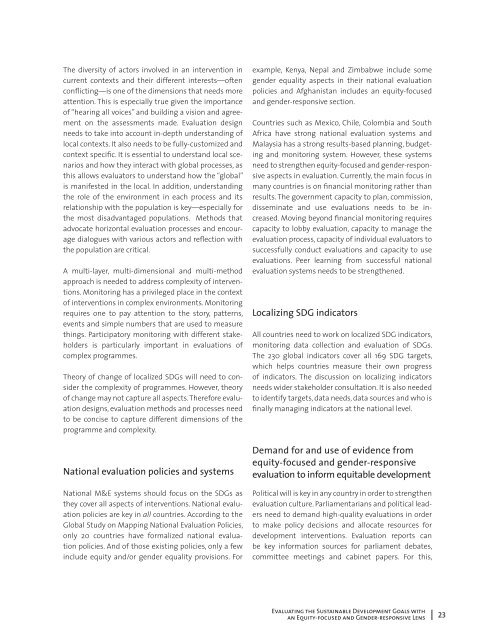NO ONE LEFT BEHIND
NY-Events-Report_WEB
NY-Events-Report_WEB
Create successful ePaper yourself
Turn your PDF publications into a flip-book with our unique Google optimized e-Paper software.
The diversity of actors involved in an intervention in<br />
current contexts and their different interests—often<br />
conflicting—is one of the dimensions that needs more<br />
attention. This is especially true given the importance<br />
of “hearing all voices” and building a vision and agreement<br />
on the assessments made. Evaluation design<br />
needs to take into account in-depth understanding of<br />
local contexts. It also needs to be fully-customized and<br />
context specific. It is essential to understand local scenarios<br />
and how they interact with global processes, as<br />
this allows evaluators to understand how the “global”<br />
is manifested in the local. In addition, understanding<br />
the role of the environment in each process and its<br />
relationship with the population is key—especially for<br />
the most disadvantaged populations. Methods that<br />
advocate horizontal evaluation processes and encourage<br />
dialogues with various actors and reflection with<br />
the population are critical.<br />
A multi-layer, multi-dimensional and multi-method<br />
approach is needed to address complexity of interventions.<br />
Monitoring has a privileged place in the context<br />
of interventions in complex environments. Monitoring<br />
requires one to pay attention to the story, patterns,<br />
events and simple numbers that are used to measure<br />
things. Participatory monitoring with different stakeholders<br />
is particularly important in evaluations of<br />
complex programmes.<br />
Theory of change of localized SDGs will need to consider<br />
the complexity of programmes. However, theory<br />
of change may not capture all aspects. Therefore evaluation<br />
designs, evaluation methods and processes need<br />
to be concise to capture different dimensions of the<br />
programme and complexity.<br />
National evaluation policies and systems<br />
National M&E systems should focus on the SDGs as<br />
they cover all aspects of interventions. National evaluation<br />
policies are key in all countries. According to the<br />
Global Study on Mapping National Evaluation Policies,<br />
only 20 countries have formalized national evaluation<br />
policies. And of those existing policies, only a few<br />
include equity and/or gender equality provisions. For<br />
example, Kenya, Nepal and Zimbabwe include some<br />
gender equality aspects in their national evaluation<br />
policies and Afghanistan includes an equity-focused<br />
and gender-responsive section.<br />
Countries such as Mexico, Chile, Colombia and South<br />
Africa have strong national evaluation systems and<br />
Malaysia has a strong results-based planning, budgeting<br />
and monitoring system. However, these systems<br />
need to strengthen equity-focused and gender-responsive<br />
aspects in evaluation. Currently, the main focus in<br />
many countries is on financial monitoring rather than<br />
results. The government capacity to plan, commission,<br />
disseminate and use evaluations needs to be increased.<br />
Moving beyond financial monitoring requires<br />
capacity to lobby evaluation, capacity to manage the<br />
evaluation process, capacity of individual evaluators to<br />
successfully conduct evaluations and capacity to use<br />
evaluations. Peer learning from successful national<br />
evaluation systems needs to be strengthened.<br />
Localizing SDG indicators<br />
All countries need to work on localized SDG indicators,<br />
monitoring data collection and evaluation of SDGs.<br />
The 230 global indicators cover all 169 SDG targets,<br />
which helps countries measure their own progress<br />
of indicators. The discussion on localizing indicators<br />
needs wider stakeholder consultation. It is also needed<br />
to identify targets, data needs, data sources and who is<br />
finally managing indicators at the national level.<br />
Demand for and use of evidence from<br />
equity-focused and gender-responsive<br />
evaluation to inform equitable development<br />
Political will is key in any country in order to strengthen<br />
evaluation culture. Parliamentarians and political leaders<br />
need to demand high-quality evaluations in order<br />
to make policy decisions and allocate resources for<br />
development interventions. Evaluation reports can<br />
be key information sources for parliament debates,<br />
committee meetings and cabinet papers. For this,<br />
Evaluating the Sustainable Development Goals with<br />
an Equity-focused and Gender-responsive Lens 23


